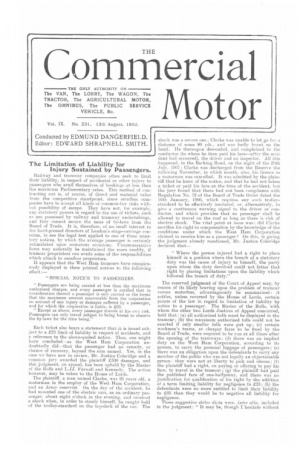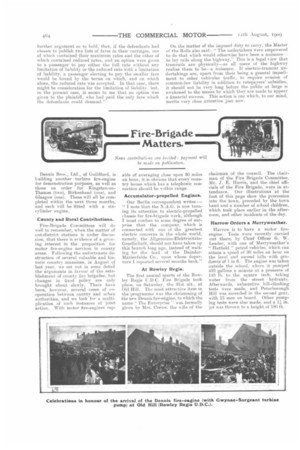The Limitation of Liability for Injury Sustained by Passengers.
Page 1

Page 2

If you've noticed an error in this article please click here to report it so we can fix it.
Railway and tramway companies often seek to limit their liability, in respect of accidental or other injury to passengers who avail themselves Of bookings at less than the maximum Parliamentary rates. This method of contracting out is, of course, of direct and material value from the competitive standpoint, since omnibus companies have to accept all kinds of common-law risks without possibility of escape. They have not, for example, any statutory powers in regard to the use of tickets, such as are possessed by railway and tramway undertakings, and they cannot secure the issue of by-laws from the Board of Trade. It is, therefore, of no small interest to the hard-pressed directors of London's stage-carriage concerns, to see the legal test applied to one of these minatory notices, by which the average passenger is certainly intimidated upon numerous occasions. Unremunerative fares may naturally be maintained the more readily, if tramcar proprietors can evade some of the responsibilities which attach to omnibus proprietors.
It appears that the West Ham tramcars have conspicuously displayed in them printed notices to the following effect:— " SPECIAL NOTICE TO PASSENGERS.
" Passengers are being carried at less than the maximum authorized charges, and every passenger is notified that in consideration thereof a passenger is only carried on the terms that the maximum amount recoverable from the corporation on account of any injury or damages suffered by a passenger, and for which the corporation is liable, is £25. " Except as above, every passenger travels at his own risk. Passengers can only travel subject to being bound to observe the by-laws for the time being."
Each ticket also bears a statement that it is issued subject to a 25 limit of liability in respect of accidents, and a reference to the above-quoted notice. Thus, one might have concluded—as the West Ham Corporation undoubtedly did—that the passenger had no remedy, or chance of recovery, beyond the sum named. Yet, in the case we have now to review, Mr. Justice Coleridge and a common jury awarded the plaintiff £500 damages, and this judgment, on appeal, has been upheld by the Master of the Rolls and L.JJ. Farwell and Kennedy. The action however, may be taken to the House of Lords.
The plaintiff, a man named Clarke, was 26 years old, a motorman in the employ of the West Ham Corporation, and an Army reservist. On the day of the accident, he had mounted one of the electric cars, as an ordinary passenger. about eight o'clock in the evening, and received a shock when, in order to steady himself, he caught. hold of the trolley-standard on the top-deck of the car. The shock was a. severe one; Clarke was unable to let go for a distance of sonic 80 yds., and was badly burnt on the hand. He thereupon descended, and complained to the conductor (to whom he then paid his fare—offer the accident had occurred), the driver and an inspector. All this happened, in the Barking Road, on the night of the 20th July, 1907; Clarke was discharged from the Reserve the following November, in which month, also. Ids licence as a motorman was cancelled. It was admitted by the plaintiff that he knew of the notice, and that lie had not taken a ticket or paid his fare at the time of the accident, but the jury found that there had not been compliance with Regulation No. 12 of the Board of Trade Order dated the 1.6th January, 1906, which requires any such trolleystandard to be effectively insulated, or, alternatively, to give a continuous warning signal to the driver or conductor, and which provides that no passenger shall be allowed to travel on the roof as long as there is risk of electric shock. The vital point at issue was: did Clarke sacrifice his right to compensation by the knowledge of the conditions under which the West Ham Corporation claimed to receive him as a passenger? On this, in giving the judgment already mentioned, Mr. Justice Coleridge declared that " Where the person injured had a right to place himself in a position where the breach of a statutory duty was the cause of injury to himself, the party upon whom the duty devolved could not fetter that right by placing limitations upon the liability which followed the breach of duty."
The reserved judgment of the Court of Appeal may, by reason of its likely bearing upon the problem of tramcar versus motorbus, advantageously be summarized: it settles, unless reversed by the House of Lords, certain points of the law in regard to limitation of liability by notice to a passenger. The Master of the Rolls, with whom the other two Lords Justices of Appeal concurred, held that: (a) all authorized tolls must be displayed in the tramcar; (b) the maximum authorized tolls could not he exacted if only smaller tolls were put up; (c) certain workmen's trams, at cheaper fares to be fixed by the Board of Trade, were required to be run at all times after the opening of the tramways; (d) there was an implied duty on the West Ham Corporation, according to its powers, to carry the personal luggage of passengers; (e) there was an obligation upon the defendants to carry any member of the public who was not legally an objectionable person—they were not at liberty to pick and choose; (f) the plaintiff had a right, on paying or offering to pay his. fare, to travel in the tramcar; (g) the plaintiff had paid the published fare of one-halfpenny, and there was no justification for qualification of his right by the addition of a term limiting liability for negligence to £25; (h) the defendants were no more entitled to limit their liability to 25 than they would be to negative all liability for negligence.
These suggestive °biter dicta were, inter -cilia, included in the judgment : " It may be, though I hesitate without
further argument so to hold, that, if the defendants had chosen to publish two lists of fares in their carriages, one of which contained their maximum rates and the other of which contained reduced rates, and an option were given to a passenger to pay either the full rate without any limitation of liability or the reduced rate with a limitation of liability, a passenger electing to pay the smaller fare would be bound by the terms on which, and on which alone, the reduced rate was accepted. In that case, there might be consideration for the limitation of liability, but, in the present case, it seems to me that no option was given to the plaintiff, who had paid the only fare which the defendants could demand."
On the matter of the imposed duty to carry, the Master of the Rolls also said : " The undertakers were empowered to do that which would otherwise have been a nuisanceto lay rails along the highway." This is a legal view that tramrails are physically—as all users of the highway realize them to be—a nuisance. If electric-tramcar undertakings are, apart from their being a general impediment to other vehicular traffic, to require evasion of common-law liability in addition to ratepayers' subsidies, it should not be very long before the public at large is awakened to the means by which they are made to appear a financial success. This action is one which, to our mind, merits very close attention just now.


















